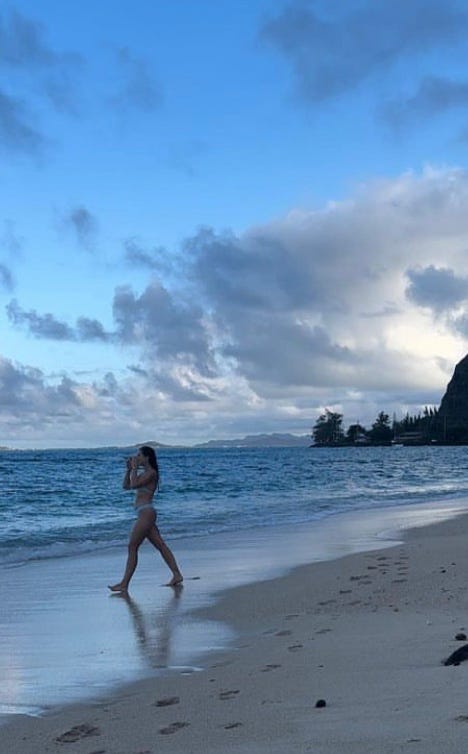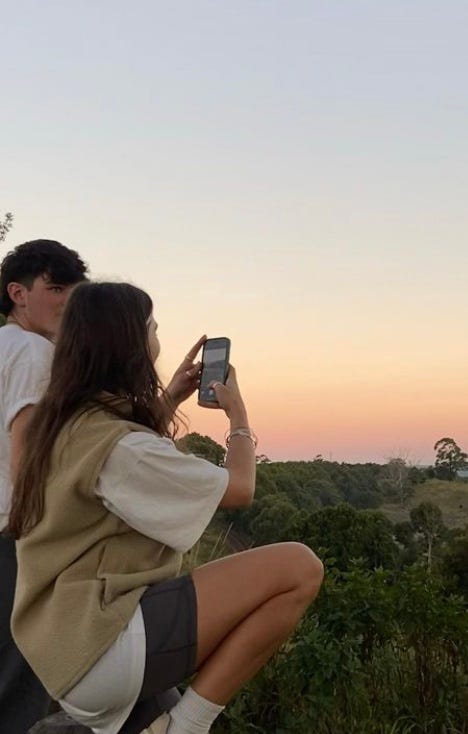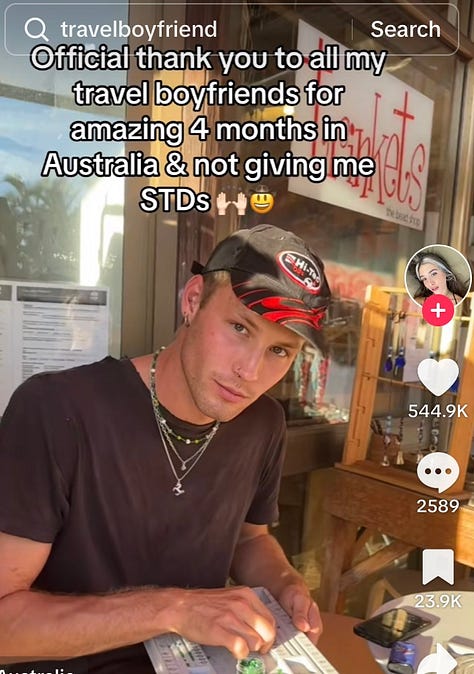You’ll need to have a few things in common for a happy relationship: lifestyle preferences, family values, coexistence at a communal hob in Byron Bay. Whilst travelling Australia, Polish TikToker Mia Fedor has popularised the Travel Boyfriend phenomenon, a distinctly post-pandemic take on the holiday romance where emotional intimacy is key and everything else is blissfully temporary.
If TikTok’s algorithm decrees that Mia’s content is ‘for you’ you might feel slightly overwhelmed by the saturation of sunny beaches and the smiling face of every consenting man Australia has to offer. In one viral post, she explains the tenets of her philosophy (whilst getting ready for a date). A Travel Boyfriend is simply “someone that you meet in a hostel that you wish to connect with” and falls “somewhere between a hook-up and a relationship.” The man in question has a lifespan of days — a couple of weeks if he’s really something — and then fades away with a bus ticket long before heartbreak becomes an option.
Mia is beautiful, young, and hard to make a first impression of. She’s resplendent in Gen Z’s baggy uniform and bleach-blonde money pieces, but there’s a mature authenticity to her and her doctrine. Mainstream media loves to report on Gen Z’s cultural rejection of casual sex, and the Travel Boyfriend philosophy seems to play into this narrative. I assume that she’s in her early twenties and packing in some memories after university. But when I sit down to meet her, Mia turns out to be Mirela, a 30-year-old businesswoman with a baby face and 12 years of work behind her.
Having emigrated from Poland at 18, Mia worked through university, building a successful, Bristol-based career in property management. The move to Australia was the result of many factors: crap weather, rising living prices, and an ex renting the upstairs flat. The Travel Boyfriend trail began with the need to make friends in a new continent and spiralled into a hashtag.
“I have lost 3 years of life due to the pandemic. I needed to catch up on actual living.”
The dates are generally sober and outward bound, tied into seeing as much of the country as possible. She explains that “the line between hanging out and a date is blurry” when both parties are prioritising their own travel experience. “I’d be disappointed if a man invited me to a bar when you have a beach and a sunset 3 minutes down the road! You aren’t travelling to find a man, they just happen and you roll with this, so at some point, every time you see each other becomes a date because there is so much to see and do. And if you are lucky enough to conquer a local man then you get a free travel guide.” Rolling together and conquering sound slightly different to me but I’ll take her word for it. The sober-curious aspect is yet another generically Gen Z characteristic, but she shows me her passport and promises that everyone underestimates her age.
“If you are lucky enough to conquer a local man then you get a free travel guide”
Deep into gossip by this point I ask her about her favourite travel boyfriend; the look on her face tells me it was far more than “somewhere between a hook-up and a relationship.” “J was from Germany. Much younger than me and standing at 6’8 with a mullet he was definitely out of my league. We bonded over the common passions of music, fashion and stories of his life in Berlin. I can’t imagine a more romantic day. We grabbed coffee in town, decided to get piercings where he held my hand the whole time, then went to make matching beaded necklaces, grabbed a burger and drove to the most stunning sunset spot. We talked about family trauma and our hopes and dreams. If my future partner doesn’t do this shit I don’t want him. J set the bar really high and was the definition of ‘if he wanted to, he would.’”
J is one of tens, but the one that got away. Before our call, I had assumed that the whole experience was far more about Mia's relationship with herself than with any man she might meet, the attractive company simply an embellishment to sightseeing. And even after this account of J, the tension between emotional depth and emotional tourism seems slightly strange. I ask her if self-discovery is the main motivation for these affairs and she adopts a sisterly tone to dodge the question.
“Travelling shapes who you are going to become in the best way. How can you know that what you like is what you like without knowing what’s there? The Travel Boyfriends allow you to explore the parts of yourself that might stay hidden in your day-to-day life back home. My other German Travel Boyfriend cured 3 years of trauma from my ex within 3 days by showing me how I should be treated and healing the toxic patterns.”
“Each of them helped me to cherish the moments of love and affection and be grateful for the little things. I deal with separation better now. Not everyone is meant to stay in your life forever, people come and go and we should enjoy them when they are here even if it’s just for a little while.” So yes. No matter how amazing these hostel-dwellers might be, it's more about you than them.
“It makes me strong emotionally and grows my understanding of myself. It’s an investment.”
I notice that she mentions “moments of love”, an apt tagline for her Antipodean lifestyle. All of Mia’s commenters express one raging concern: “How do you not fall in love?” Fearing this eventuality after three days and a matcha on the beach seems sadly vulnerable – appropriate to the sober, sexless pastiche that older generations like to paint of twenty-somethings – but I ask her anyway. “You do fall in love” she replies wistfully. Then she tells me about the time three of her Travel Boyfriends met and had a fight in the ER room.






